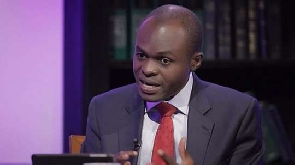- Home - News
- TWI News | TV
- Polls
- Year In Review
- News Archive
- Crime & Punishment
- Politics
- Regional
- Editorial
- Health
- Ghanaians Abroad
- Tabloid
- Africa
- Religion
- Election 2020
- Coronavirus
- News Videos | TV
- Photo Archives
- News Headlines
- Press Release
General News of Thursday, 19 October 2023
Source: www.ghanaweb.com
Martin Kpebu ‘schools’ Paul Adom-Otchere on copyright law
Lawyer Martin Kpebu has ‘schooled’ journalist Paul Adom-Otchere on Ghana’s copyright laws when it comes to the ownership rights to books.
Paul Adom-Otchere accused Martin Kpebu of trying to steal a book he (Kpebu) wrote together with lawyer Fred Kusim Awindaogo, titled; the ‘Annotated Evidence Act of Ghana’.
The journalist claimed that the Annotated Evidence Act of Ghana was the intellectual property of Kusim Awindaogo because he brought up the idea of writing the book.
However, lawyer Kpebu in an interview with GhanaWeb, on October 19, 2023, said that Paul Adom-Otchere’s assessment is totally wrong.
He said that coming up with an idea does not make one the owner of a book because the copyright requires that one must take part in the writing of the book in order to own it.
“The main part Paul got wrong is that when it comes to writing books, copyright, the idea alone doesn’t make you an owner… copyright is about what you succeed in writing.
“Paul was misleading his audience… if you bring an idea alone you can not get copyright. You can only get copyright for what you can write. So, when Paul Adom-Otchere was saying that because Fred brought the idea and it is very, very important and I was trying to steal, it is wrong,” he said.
He added, "If you ask that we write a book together and at the end of the day you can not write; if I write the book it is mine, you can’t put your name because you brought just the idea”.
What Ghana’s Copyright Law on books says:
The Copyright Act, 2005, states that the author, co-author or joint author of a literary work is entitled to copyright and protection. It, however, exempts ideas from being copyrighted.
Section 1— Work eligible for copyright
(1) An author, co-author or joint author of any of the following works is entitled to the copyright
and protection afforded to that work under this Act
(a) literary work,
(b) artistic work,
(c) musical work,
(d) sound recording,
(e) audio-visual work,
(f) choreographic work,
(g) derivative work, and
(h) computer software or programmes.
(2) Despite subsection (1), a work is not eligible for copyright unless
(a) it is original in character,
(b) it has been fixed in any definite medium of expression now known or later to be
developed with the result that the work can either directly or with the aid of any machine
or device be perceived, reproduced or otherwise communicated, and
(c) it is
(i) created by a citizen or a person who is ordinarily resident in the Republic,
(ii) first published in the Republic and in the case of a work first published outside
the Republic is subsequently published in the Republic within thirty days of its
publication outside the Republic, or
(iii) a work in respect of which the Republic has an obligation under an international
treaty to grant protection.
(3) The eligibility of a work for copyright is not affected by its artistic quality, the purpose of the
author in creating it or by the manner or form of its expression.
(4) For the purposes of this section a work is original if it is the product of the independent effort
of the author.
Section 2—Ideas, concepts excluded from copyright
Copyright shall not extend to ideas, concepts, procedures, methods or other things of a similar
nature.
BAI/AW
You can also watch the latest episode of Everyday People on GhanaWeb TV below:
Ghana’s leading digital news platform, GhanaWeb, in conjunction with the Korle-Bu Teaching Hospital, is embarking on an aggressive campaign which is geared towards ensuring that parliament passes comprehensive legislation to guide organ harvesting, organ donation, and organ transplantation in the country.











